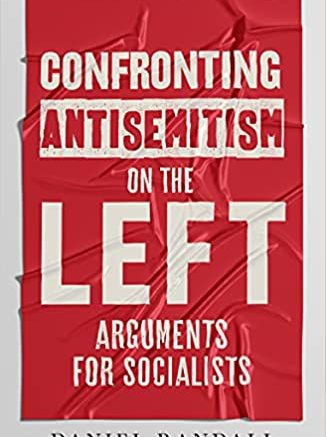Dan Randall is a British socialist and opponent of anti-semitism. That should be a tautology; after all, aren’t socialists by definition opponents of all forms of racism, including anti-semitism? Clearly not. Randall is a member of small revolutionary socialist organisation which is almost unique on the British far left for not being anti-semitic to one degree or another. In this well-written book, Randall says the kinds of things that should be obvious to socialists, but are not.
While I agree with his arguments (mostly) I think there are things he gets wrong.
He strongly advocates debating anti-semites on the Left not in order to change their opinions, but to influence an audience that might still be persuaded. As someone who has done this on a number of occasions, including a couple of televised debates, I’m not sure it’s such a good idea. I have actually tried to explain to audiences that Jews, even Israeli Jews, are human, feel empathy and love, and care about children. In other words, I’ve had to channel Shakespeare’s Shylock — in particular the line “If you prick us, do we not bleed?” I have not always found audiences open to this simple idea.
I also think that Randall could have found some better sources to make his arguments. If I were looking for African American leaders who had expressed sympathy for the state of Israel and Zionism, I might have started at the very top, with Dr. Martin Luther King, A. Philip Randolph and Bayard Rustin. Instead, Randall finds some little-known quote from Eldridge Cleaver, a leading figure in the Black Panther Party which was not known for its sympathy towards Jews and Israel. And in the quote, Cleaver seems to be endorsing the utopian back-to-Africa ideas of Marcus Garvey. In contrast, Dr. King said things like this: “Peace for Israel means security, and we must stand with all our might to protect its right to exist, its territorial integrity. I see Israel as one of the great outposts of democracy in the world.”
In my opinion, the book would also have benefited from some examples outside of the UK. One thing that was striking in recent years was that while the leader of the Labour Party in the UK, Jeremy Corbyn, repeatedly blurted out things that could be understood as anti-semitic (or at least incredibly insensitive towards Jews), the most important leader of the democratic Left in America, Senator Bernie Sanders, did nothing of the sort. Sanders famously defended Israel’s right to defend itself against Hamas rocket attacks at the same time as Corbyn — and most of the British left — supported Hamas and Hizbollah, which Randall correctly labels as reactionary organisations. Why the American Left wound up with a leader who has a sane and balanced view while the British Left wound up with Corbyn is something that needs to be addressed.
As an active trade unionist, I also expected Randall to explore in greater detail the problems opponents of anti-semitism face in British unions. Support for boycotting Israel (the BDS campaign) was strong in some British unions (such as the university lecturers) long before it got a foothold in the Labour Party.
I think to write about the Israeli labour movement, as Randall does, and focus solely on some very small, and in some cases fringe, organisations while largely ignoring the Histadrut is problematic. Whatever Randall’s criticisms of the Histadrut may be (he doesn’t really elaborate), there can be no denying that it is the largest trade union by far for Palestinians living in Israel (and of course, for Jewish Israeli workers).
Finally there is an over-reliance on quotes and citations from Dan’s comrades in his organisation. There are many people who have written about, and continue to write about, these issues, sometimes with real originality and insight. The fact that some of these people may be former members of Randall’s organisation should not have kept them out of the story. Online publications including Fathom and Engage are examples of places where leftists and trade unionists have grappled with the issues raised in Randall’s book, sometimes for many years, and yet he never seems to quote them or even notice them.
Having said all that, it may be that I’m criticising Randall for not writing the book that I would have written, which would be unfair. I am, for example, a socialist Zionist. Randall is not.
His book deserves a wide readership in the British labour movement, including the trade unions.
